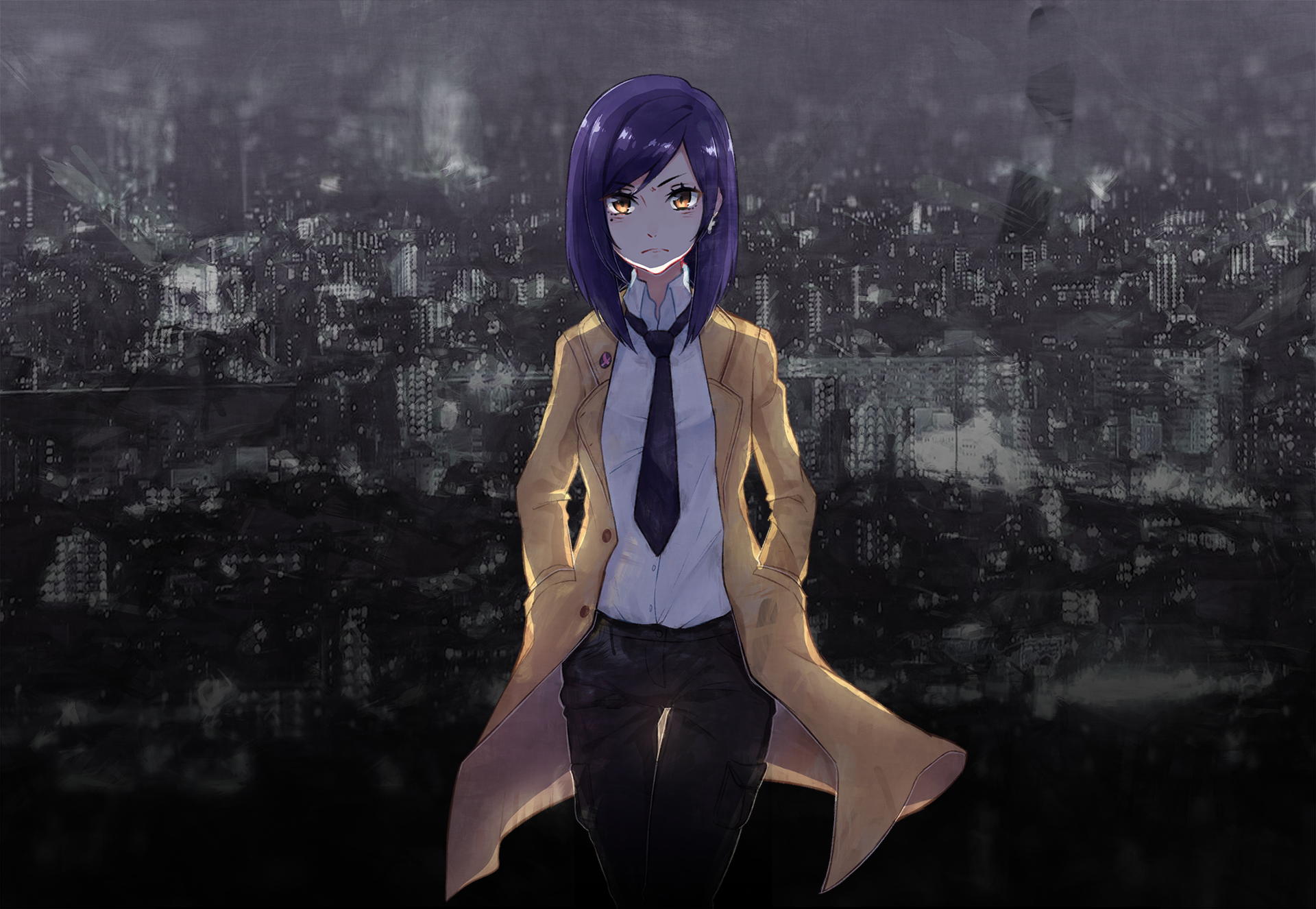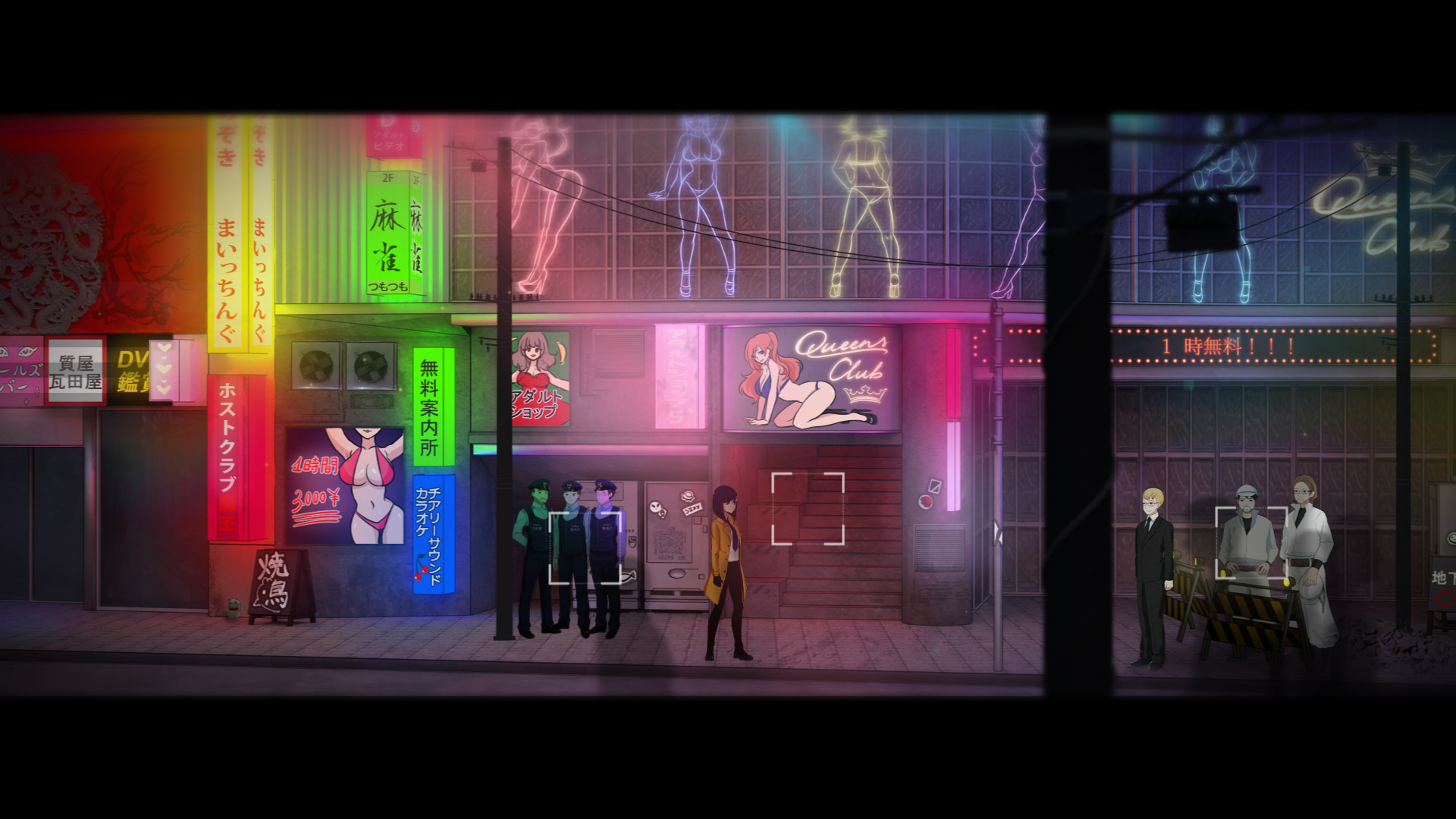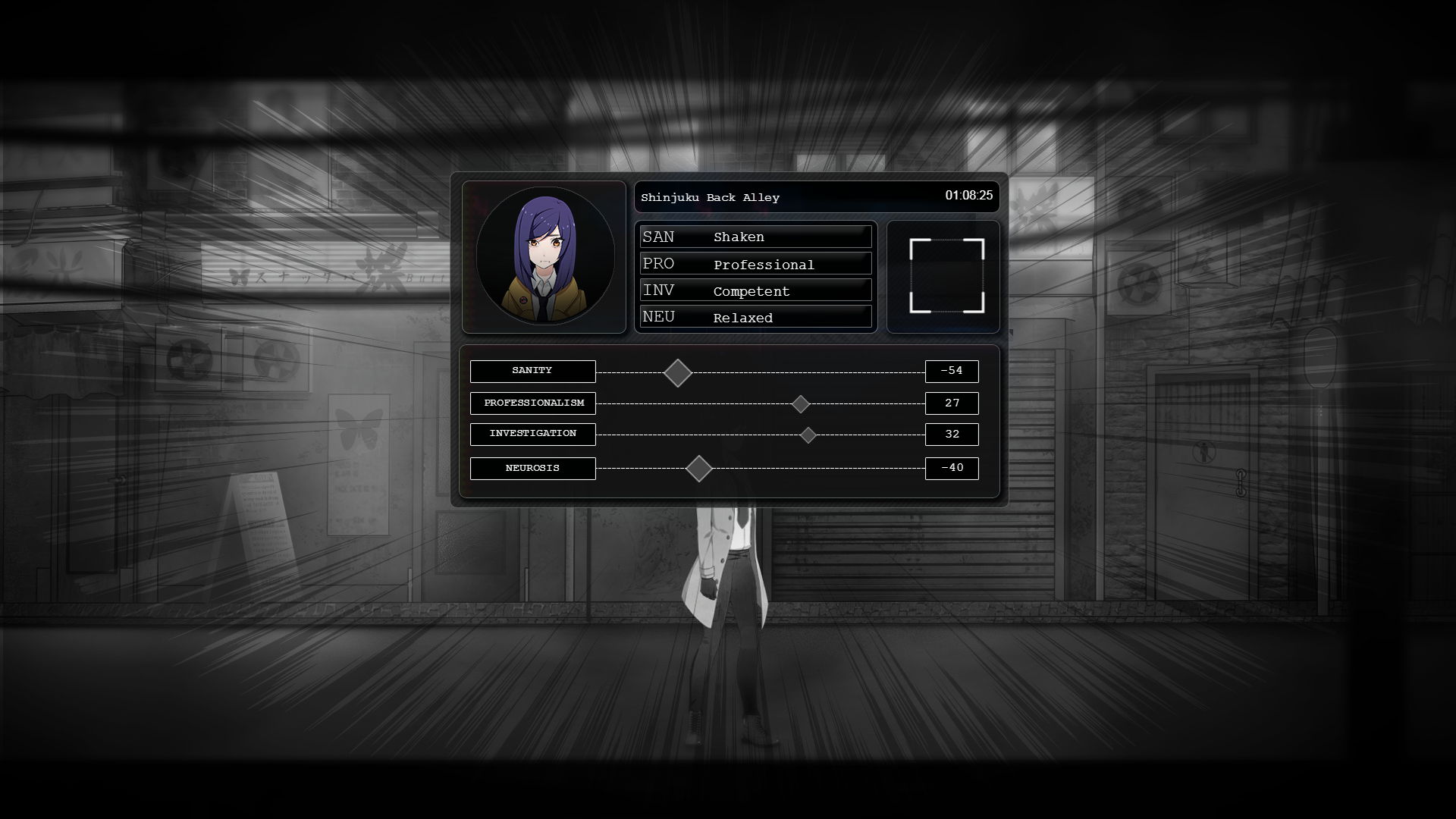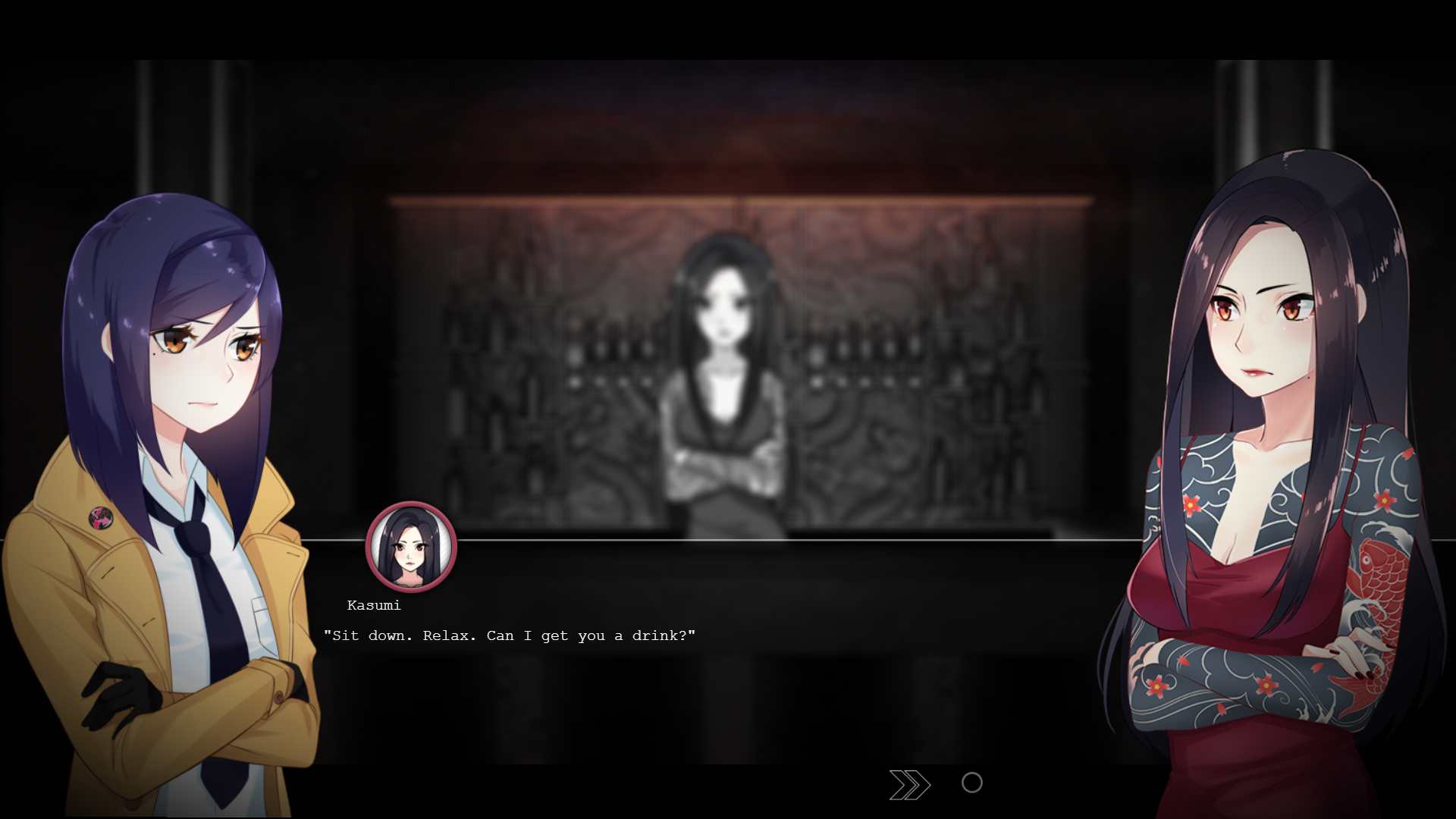Tokyo Dark adds a western adventure game twist to the Japanese visual novel
Tokyo Dark's psychological thriller storyline and clever sanity system may change how you think about visual novels.

Detective Itō is losing it. She wanders into a greasy hostess bar somewhere on the tough side of Shinjuku and orders a whiskey—neat, served with ice. Her vision goes soft, and I watch the tabulated points in her “professionalism” meter deteriorate. Whatever. She looked like she needed to take a load off.
It's a short reprieve. A few moments later I’m out back, ear pressed to a dumpster, listening to my missing partner’s cell phone ringing off the hook. The lock on the plastic flap won’t budge, but as far as I’m concerned, Itō is armed for a reason. I take aim and blast the dumpster open with a pair of bullets. My impulsiveness gnaws at her sanity, but after answering the phone, at least now we know our man is being held hostage somewhere in the sewers.
Jon Williams, creative director of Cherrymochi, tells me that while Tokyo Dark, released today, takes cues from harrowing choice-a-thons like Dontnod’s Life Is Strange and psychological thrillers like Se7en, the majority of his inspiration was drawn from the city itself.
“This story could not take place in any other city in the world,” he explains. “As much as we've been inspired by games, comics, movies and books, late night walks around the neon-lit street of the metropolis has been a major source of inspiration for us. Players will learn a little what to expect from different cities within Tokyo. Though the reality might be a little less dark.”
Tokyo by night
The aesthetic fetishization is clear: boarded-up yakitori shops, lecherous creeps in three-piece suits, a constant drizzle of rain no matter where you are in the city. It’s all there, and it’s all effective, but Williams’ work is also built upon one of the most Japanese-specific design philosophies in the history of games. Spiritually, Tokyo Dark is a visual novel.

If you’re not familiar with the form, visual novels can be considered the Eastern answer to SCUMM-era adventure games. They both prioritize narrative, but in visual novels the pretzel logic takes a backseat to long, winding, multi-chaptered character sketches that can occasionally spill beyond the 50-hour mark. Traditionally, the people that populate visual novels are presented as human beings with pre-assigned personalities and perspectives—meaning you won’t face a dialogue choice at every junction like you did with, say, Lee in Telltale’s The Walking Dead.
With its 11 endings and scores of potential deviations, Tokyo Dark encourages wielding every monkey wrench in a player’s arsenal.
That intense focus on character and story can occasionally make visual novels a passive experience, an endless stream of text punctuated with sporadic puzzle solving. Development teams stymie player interaction to make sure that they can tell their tale without the risk of significant derailment. So perhaps you can consider Tokyo Dark a protest against the visual novel status quo. With its 11 endings and scores of potential deviations, the game encourages wielding every monkey wrench in a player’s arsenal.
The biggest gaming news, reviews and hardware deals
Keep up to date with the most important stories and the best deals, as picked by the PC Gamer team.
“Our goal was to experiment mixing the narrative depth from Japanese visual novels and the exploration of western adventure games. We wanted to make a game where players would have options with how they tackle situations, but then have to deal with the consequences later,” says Williams. “Looking at Japanese visual novels we felt that often the systems and stories are quite formulaic. Tokyo Dark is our reaction to that, to try and mix what we feel are the most interesting parts of Japanese and Western interactive narratives.”
Some of the tricks Tokyo Dark borrows from the West should be pretty familiar. When I finally made my way into those foreboding sewers and came face-to-face with my partner’s captor, a countdown timer rushed me into action as I was presented with a half-dozen options to get her to lower the knife from his throat. Do I draw my gun? Do I sympathize? Do I threaten her? My partner is begging me to turn and run. Should I listen to him?

I ended up trying (and failing) to talk her down, but after that scenario I kept thinking about what might have happened if I opted to just take off. Watching my partner bleed out wasn’t great for Itō’s mental health.
That’s the other interesting thing about how Tokyo Dark presents its choices. Everything is determined by certain multipliers on Itō’s S.P.I.N. (Sanity, Professionalism, Investigation, Neurosis.) If I make too many choices that deplete her sanity, I could be at risk of a mental shutdown in the face of a high-stakes decision. I can regain some stability by playing with my cat or taking anti-psychotic prescription, but the latter has an inverse effect on my investigation skill, meaning I won’t be presented with the same depth of options while I’m chasing the case.
It’s a novel way to inject a level of RPG-style min-maxing to an adventure game, and I like the idea of specific Itō “builds” surfacing in the near future. The weight of each decision you make over the course of the game has a dramatic pull on the overall story (so much so that Cherrymochi doesn’t expect anyone to fully uncover the core mystery without multiple play-throughs). There are plenty of of fluffy anime moments too—like your dough-punching neighbor who offers up a home cooked meal every time Itō returns to her apartment—but it never veers into wacky comedy. There's just something inherently anime about regaining sanity by playing with your cat.
There's just something inherently anime about regaining sanity by playing with your cat.
The narrative itself quickly morphs from a neo-noir detective saga to something more supernatural (and more Japanese), and the localization is strong, stylish, and contemporary. Williams tells me that Tokyo Dark was developed in both languages simultaneously, with a constant communication of ideas between the two versions. It’s a strategy that makes perfect sense given how everything else in the game feels like a mashup between Western and Eastern sensibilities.

But honestly? The most exciting thing about Tokyo Dark might be what it represents for the industry. As PC Gamer reported earlier this year, Japan and the PC are having a moment. Classic visual novels like Steins;Gate used to be sequestered away on region-locked consoles, but now they’re readily available in the West. A port of Valkyria Chronicles sold 200,000 copies in its first two weeks on Steam. A generation of Japanese developers are shoring up the country’s famously anemic indie scene with the liberty afforded by PC development. So no matter what happens from here, Tokyo Dark remixing a classic Japanese PC genre with a classic Western one feels like a small triumph.
“Funding for indies is an issue here where there is very little government recognition or business support for small studios," says Williams. "Taking out a bank loan for a new indie game studio is practically impossible. It's fantastic that Kickstarter is launching in Japan this month. This will make it much easier for Japanese indies to reach out to show the world what they are working on. For us to Kickstart Tokyo Dark we had to go via business connections in Canada. It was very complex! There is a lot of incredible talent and creativity here, bubbling away in monthly indie meet-ups waiting to be unleashed to the rest of the world."

Luke Winkie is a freelance journalist and contributor to many publications, including PC Gamer, The New York Times, Gawker, Slate, and Mel Magazine. In between bouts of writing about Hearthstone, World of Warcraft and Twitch culture here on PC Gamer, Luke also publishes the newsletter On Posting. As a self-described "chronic poster," Luke has "spent hours deep-scrolling through surreptitious Likes tabs to uncover the root of intra-publication beef and broken down quote-tweet animosity like it’s Super Bowl tape." When he graduated from journalism school, he had no idea how bad it was going to get.

